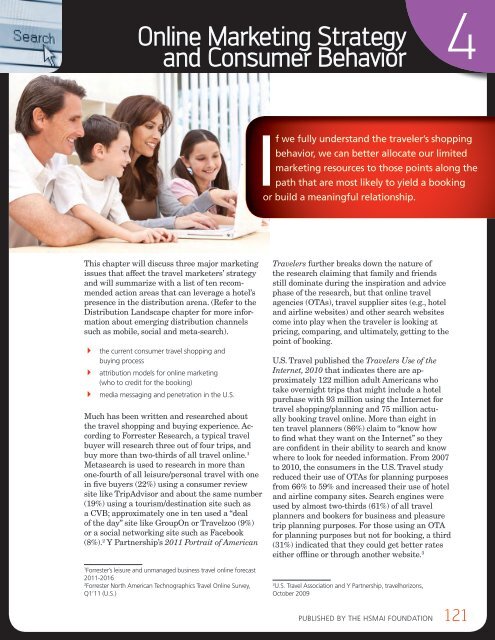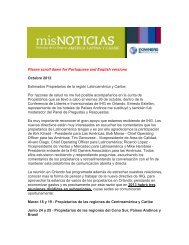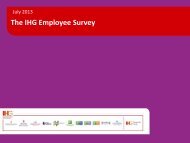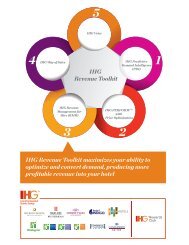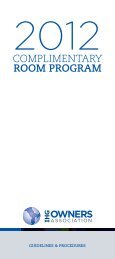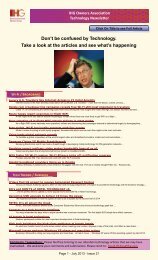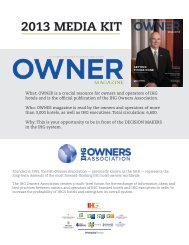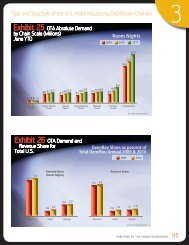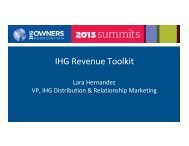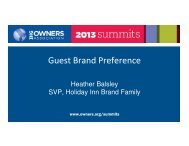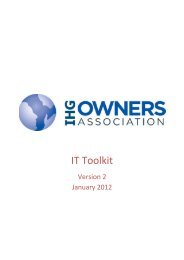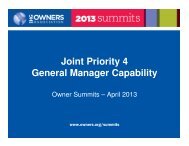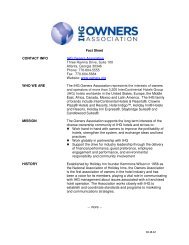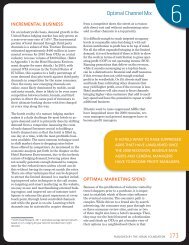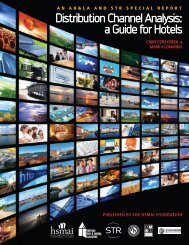Online Marketing Strategy and Consumer Behavior - IHG Owners ...
Online Marketing Strategy and Consumer Behavior - IHG Owners ...
Online Marketing Strategy and Consumer Behavior - IHG Owners ...
Create successful ePaper yourself
Turn your PDF publications into a flip-book with our unique Google optimized e-Paper software.
<strong>Online</strong> <strong>Marketing</strong> <strong>Strategy</strong><br />
<strong>and</strong> <strong>Consumer</strong> <strong>Behavior</strong><br />
This chapter will discuss three major marketing<br />
issues that affect the travel marketers’ strategy<br />
<strong>and</strong> will summarize with a list of ten recommended<br />
action areas that can leverage a hotel’s<br />
presence in the distribution arena. (Refer to the<br />
Distribution L<strong>and</strong>scape chapter for more information<br />
about emerging distribution channels<br />
such as mobile, social <strong>and</strong> meta-search).<br />
4 the current consumer travel shopping <strong>and</strong><br />
buying process<br />
4 attribution models for online marketing<br />
(who to credit for the booking)<br />
4 media messaging <strong>and</strong> penetration in the u.s.<br />
Much has been written <strong>and</strong> researched about<br />
the travel shopping <strong>and</strong> buying experience. According<br />
to Forrester Research, a typical travel<br />
buyer will research three out of four trips, <strong>and</strong><br />
buy more than two-thirds of all travel online. 1<br />
Metasearch is used to research in more than<br />
one-fourth of all leisure/personal travel with one<br />
in five buyers (22%) using a consumer review<br />
site like TripAdvisor <strong>and</strong> about the same number<br />
(19%) using a tourism/destination site such as<br />
a CVB; approximately one in ten used a “deal<br />
of the day” site like GroupOn or Travelzoo (9%)<br />
or a social networking site such as Facebook<br />
(8%). 2 Y Partnership’s 2011 Portrait of American<br />
1Forrester’s leisure <strong>and</strong> unmanaged business travel online forecast<br />
2011-2016<br />
2Forrester north American technographics travel online survey,<br />
Q1’11 (u.s.)<br />
Travelers further breaks down the nature of<br />
the research claiming that family <strong>and</strong> friends<br />
still dominate during the inspiration <strong>and</strong> advice<br />
phase of the research, but that online travel<br />
agencies (OTAs), travel supplier sites (e.g., hotel<br />
<strong>and</strong> airline websites) <strong>and</strong> other search websites<br />
come into play when the traveler is looking at<br />
pricing, comparing, <strong>and</strong> ultimately, getting to the<br />
point of booking.<br />
U.S. Travel published the Travelers Use of the<br />
Internet, 2010 that indicates there are approximately<br />
122 million adult Americans who<br />
take overnight trips that might include a hotel<br />
purchase with 93 million using the Internet for<br />
travel shopping/planning <strong>and</strong> 75 million actually<br />
booking travel online. More than eight in<br />
ten travel planners (86%) claim to “know how<br />
to find what they want on the Internet” so they<br />
are confident in their ability to search <strong>and</strong> know<br />
where to look for needed information. From 2007<br />
to 2010, the consumers in the U.S. Travel study<br />
reduced their use of OTAs for planning purposes<br />
from 66% to 59% <strong>and</strong> increased their use of hotel<br />
<strong>and</strong> airline company sites. Search engines were<br />
used by almost two-thirds (61%) of all travel<br />
planners <strong>and</strong> bookers for business <strong>and</strong> pleasure<br />
trip planning purposes. For those using an OTA<br />
for planning purposes but not for booking, a third<br />
(31%) indicated that they could get better rates<br />
either offline or through another website. 3<br />
3u.s. travel Association <strong>and</strong> y Partnership, travelhorizons,<br />
october 2009<br />
4<br />
If we fully underst<strong>and</strong> the traveler’s shopping<br />
behavior, we can better allocate our limited<br />
marketing resources to those points along the<br />
path that are most likely to yield a booking<br />
or build a meaningful relationship.<br />
Published by the hsMAi FoundAtion 121
Each hotEl has to do thE hard<br />
work of undErst<strong>and</strong>Ing Its own<br />
consumEr basE <strong>and</strong> what drIvEs<br />
Its customErs to makE thE dEcIsIon<br />
to book wIth thE hotEl.<br />
When considering offline channels, the estimates<br />
for traditional travel agency involvement range<br />
from 17% (Forrester) to 23% (Y Partnership)<br />
but either way, the numbers are still significant<br />
enough to keep this booking channel in mind<br />
when developing a hotel marketing plan. The<br />
major chains still successfully run extensive<br />
training <strong>and</strong> incentive programs to reward <strong>and</strong><br />
reinforce relationships with retail agents for both<br />
corporate <strong>and</strong> leisure sales.<br />
Given the wide range of information sources<br />
tapped in the course of a travel booking,<br />
it creates a challenge for the hotel marketers<br />
to ensure that they are appropriately<br />
represented in the places where<br />
their consumers are most likely to pass.<br />
In order to plan relevant content <strong>and</strong><br />
decide where to apply limited marketing<br />
resources for well-placed <strong>and</strong><br />
effective marketing messages, there is a<br />
dem<strong>and</strong> for business intelligence by the<br />
hotel marketer.<br />
There have not yet been attribution<br />
models deployed on an industry wide<br />
basis that help hotels figure out which<br />
websites or online communication<br />
vehicles can be credited with delivering<br />
qualified leads or actual bookings.<br />
Many still evaluate search engine marketing<br />
using a “last click attribution”<br />
model that fully credits the last website<br />
or online ad visited with sending the<br />
lead that converts. With upward of<br />
eight to ten websites (plus banner/display<br />
ads, email <strong>and</strong> other promotional<br />
vehicles) visited on the path to a hotel<br />
booking, 4 E<br />
the idea that only the last one<br />
visited, or the most recent banner ad<br />
4 comscore panel supplied by expedia for cornell study on the<br />
billboard effect, chR, chris Anderson, Search, OTAs, <strong>and</strong> <strong>Online</strong><br />
Booking: An Exp<strong>and</strong>ed Analysis of the Billboard Effect, April, 2011<br />
122 An Ah&lA And stR sPeciAl RePoRt<br />
Inspiration<br />
clicked, is the one in which to invest is not likely<br />
to be an accurate assumption.<br />
Much like choosing between a long list of newspaper<br />
<strong>and</strong> magazine advertising options in the<br />
off-line era, it is more likely that an interplay<br />
between several marketing sites drives the bookings.<br />
But which ones? And if this varies from<br />
one hotel to another, a likely situation given the<br />
unique nature of each hotel’s offerings <strong>and</strong> market<br />
position, how can any given hotel management<br />
team figure this out so that the team can<br />
spend its limited marketing funds to greatest advantage?<br />
Many vendors who offer online marketing<br />
opportunities would like the hotel marketer<br />
to believe that their website or their advertising<br />
medium is the one that is the primary driver of<br />
the marketer’s business, but there is no silver<br />
bullet, no one-size-fits-all solution that applies to<br />
all hotels. Each hotel has to do the hard work of<br />
underst<strong>and</strong>ing its own consumer base <strong>and</strong> what<br />
drives its customers to make the decision to book<br />
with the hotel.<br />
Travel Purchase Process<br />
Search Plan<br />
Prep<br />
Experience<br />
Share<br />
Book<br />
Validate
<strong>Online</strong> <strong>Marketing</strong> <strong>Strategy</strong> <strong>and</strong> <strong>Consumer</strong> <strong>Behavior</strong><br />
<strong>Consumer</strong>s typically move from the initial inspiration<br />
to take a trip <strong>and</strong> follow through with<br />
a search <strong>and</strong> planning process, culminating in<br />
a booking <strong>and</strong> stay. Although rarely linear, this<br />
travel decision process explains the travel<br />
planning, booking, <strong>and</strong> stay experience. With<br />
the explosion of travel content <strong>and</strong> tools, generally<br />
in the form of websites, mobile apps,<br />
search engines, <strong>and</strong> social media platforms,<br />
every step on this journey has implications<br />
for travel marketers <strong>and</strong> for the underlying<br />
technology that enables the traveler to<br />
conduct much of the process online.<br />
thE travEl shoppIng<br />
procEss<br />
The primary issue, when examining distribution<br />
channels, is figuring out how to<br />
influence the mix of channels that a hotel<br />
would like to utilize to achieve its performance<br />
objectives. Every hotel has an optimal<br />
channel mix based on local market dem<strong>and</strong>,<br />
the quality of the property, <strong>and</strong> its position<br />
in that market relative to its competition.<br />
For every step in the travelers shopping <strong>and</strong><br />
booking experience, there are actions a hotel<br />
marketer can take to influence it in a way<br />
that can benefit the hotel. 5<br />
Inspiration<br />
Any supplier interested in playing a role in<br />
the inspiration of a trip must consider the<br />
nature of the content he or she puts forth in<br />
the digital l<strong>and</strong>scape. When the home page<br />
of every hotel website in a market looks like<br />
every other home page, few will find that<br />
inspiring. When a third party or travel inspiration<br />
website conveys a more compelling<br />
picture than a hotel puts forth, the traveler<br />
will likely be attracted to that imagery, <strong>and</strong><br />
will often be interested in that option, even<br />
if he or she visits the hotel site as well. The<br />
website that st<strong>and</strong>s out provides a meaningful,<br />
relevant <strong>and</strong> enjoyable experience by<br />
conveying what a traveler wants to know<br />
about the hotel.<br />
5 Many examples shown in this section of the chapter come from a<br />
hitec 2011 educational session moderated by Robert cole, Rockcheetah<br />
<strong>and</strong> are used with his permission.<br />
Consider these options for a hotel in Baltimore —<br />
which would you pick?<br />
4<br />
Published by the hsMAi FoundAtion 123
Or perhaps this inspires you more?<br />
Or does this one make you want to<br />
click on the Book Now button?<br />
124 An Ah&lA And stR sPeciAl RePoRt<br />
Does this view of a hotel room make you<br />
want to see more?
<strong>Online</strong> <strong>Marketing</strong> <strong>Strategy</strong> <strong>and</strong> <strong>Consumer</strong> <strong>Behavior</strong><br />
Search<br />
When a traveler is looking around for a hotel or a<br />
destination, what does he or she look for? Great<br />
Wolf Lodge knows its moms are the primary customers.<br />
In its marketing strategy, it goes straight<br />
to the source <strong>and</strong> puts itself in front of the decision<br />
makers. A hotel marketer will want to do research<br />
<strong>and</strong> find out where the travelers go to find<br />
pertinent information <strong>and</strong> be there. Which roads<br />
lead to your hotel? The vendor you use to manage<br />
your website can help you with this research. It<br />
is readily available <strong>and</strong> you need to find out <strong>and</strong><br />
act upon this information. Then test the results<br />
until you come up with the mix of sites that<br />
drives your website’s (br<strong>and</strong>.com) business.<br />
Planning<br />
There are many ways to provide<br />
specific content that provides an<br />
incentive for the travel shopper<br />
to spend more time considering<br />
you as an option. Mammoth<br />
Mountain’s trip planner is a great<br />
example.<br />
Disney also offers a customized<br />
video solution that allows families<br />
to plan their trip.<br />
Facebook/<br />
Social<br />
Ask A Mom<br />
Be the Conduit<br />
Mom<br />
Trip Advisor/<br />
Guest Reviews<br />
YouTube<br />
greatwolf.com<br />
4<br />
Published by the hsMAi FoundAtion 125
Social Media<br />
Travel shoppers want confirmation that<br />
they are on the right track. Somewhere<br />
between searching <strong>and</strong> booking, likely<br />
in the planning <strong>and</strong> validation stage,<br />
travel shoppers will use social media most<br />
heavily. Checking out what friends <strong>and</strong><br />
family did for similar trips will provide a<br />
strong influence on the outcome. Social<br />
media also allows the marketer to focus on<br />
earning permission to enter into dialogue<br />
so the relationship can be deepened; it<br />
is in this spirit that social media should<br />
be pursued. With the volume of traffic to<br />
social media sites, more travel shoppers<br />
are visiting there at a time when they are<br />
ready to book, so this category of website<br />
may gradually evolve to be as much a<br />
booking channel as one for promotion <strong>and</strong><br />
engagement.<br />
Validation<br />
Station Casinos has created its own version<br />
of GroupOn-type coupons to reinforce the<br />
decision to choose them. A lot of compelling<br />
offers <strong>and</strong> activities are front <strong>and</strong> center on<br />
the home page to make it worth anyone’s<br />
while to take the plunge <strong>and</strong> book. The limited<br />
number of coupons available as shown<br />
by the Sold Out message creates urgency for<br />
the prospective booker.<br />
126 An Ah&lA And stR sPeciAl RePoRt
<strong>Online</strong> <strong>Marketing</strong> <strong>Strategy</strong> <strong>and</strong> <strong>Consumer</strong> <strong>Behavior</strong><br />
Booking<br />
Finally, the travel shopper becomes<br />
a booker. It would seem<br />
that this step should be the most<br />
straightforward. How can you improve<br />
on this part of the process?<br />
Management gets clickstream analytics<br />
on each step of the website<br />
visit to find out how many drop out<br />
along the way. Testing can improve<br />
common points where the consumers<br />
ab<strong>and</strong>on the process. Learning<br />
which pages are visited most often<br />
by bookers <strong>and</strong> beefing up the<br />
content on these pages can yield<br />
higher conversion rates. Although<br />
this process is rarely linear, the<br />
“funnel” metaphor is often instructive<br />
to illustrate the drop-off in the<br />
number of travelers that proceed<br />
to the ultimate booking.<br />
This sample is a Google Analytics funnel chart<br />
quantifying the online conversion process.<br />
American Casino’s Stratosphere<br />
booking engine provides clear options<br />
for room types <strong>and</strong> rates.<br />
4<br />
Published by the hsMAi FoundAtion 127
128 An Ah&lA And stR sPeciAl RePoRt<br />
Highgate Hotels’ website has imagery <strong>and</strong> a welldesigned<br />
booking engine that grabs the shopper’s<br />
attention. Rates are not complicated <strong>and</strong> the offer<br />
of room types is short <strong>and</strong> sweet. Following the<br />
consummation of the booking, you can extend the<br />
visit, get a better room, or get more flexible terms,<br />
all for a small price. This also serves as a method<br />
of post-validation for the guest.<br />
Experience<br />
Finally, the traveler gets to experience the hotel.<br />
How can you reinforce that part of the process<br />
through distribution technology? Using social <strong>and</strong><br />
mobile to convey all that the hotel has to offer will<br />
make it a better trip for the traveler <strong>and</strong> get him<br />
or her more engaged with the property. From supporting<br />
geo-location services that reward guests<br />
for “checking in” after they check-in at the front<br />
desk, to local information on activities, restaurants,<br />
<strong>and</strong> bars <strong>and</strong> attractions on a mobile app, to<br />
mobile concierge so that they know when the 10<br />
a.m. spa appointment opens up <strong>and</strong> Quick Response<br />
(QR) two-dimensional barcodes to convey<br />
more detail about menu items <strong>and</strong> wine selections,<br />
this technology will keep your customers involved<br />
<strong>and</strong> active in using the property.<br />
iPads can make check-in <strong>and</strong> -out faster or they can be<br />
available to guests for email, music <strong>and</strong> other services.
<strong>Online</strong> <strong>Marketing</strong> <strong>Strategy</strong> <strong>and</strong> <strong>Consumer</strong> <strong>Behavior</strong><br />
Y Partnership’s 2011 Portrait of American Travelers<br />
indicates that although less than one in ten<br />
travelers uses an iPad to access the Internet,<br />
those who do while traveling are most likely to<br />
use it to find restaurants or shops nearby based<br />
on specific search criteria, comparison shopping<br />
for airfares <strong>and</strong> hotel rates, <strong>and</strong> searching for the<br />
latest information on flight schedules <strong>and</strong> delays,<br />
all mentioned by roughly four in ten. Roughly<br />
one-third also uses a tablet computer to book air<br />
travel or lodging, <strong>and</strong> look for ratings or reviews<br />
of hotels, restaurants or destinations. The study<br />
further notes that tablet utilization habits mirror<br />
those observed on smartphones with one important<br />
exception: tablet users are significantly<br />
more likely to use their device to comparison shop<br />
airfares <strong>and</strong> hotel rates. 6<br />
Sharing<br />
Of course, one of the major changes in the last<br />
few years in travel shopping <strong>and</strong> buying is the<br />
sharing that occurs while someone is on a trip, or<br />
when he or she gets back. Most sharing occurs on<br />
social media sites where photos, video, <strong>and</strong> all the<br />
commentary such as complaining or gushing can<br />
be found. This ranges from Trip Advisor reviews<br />
to Flickr, YouTube, <strong>and</strong>, of course, Facebook.<br />
6 y Partnership, insights blog <strong>and</strong> 2011 Portrait of American<br />
Travelers, April 28, 2011<br />
Kiawah Isl<strong>and</strong> Golf Resort offers<br />
its guests a scrapbook to send<br />
in photos <strong>and</strong> then refer friends<br />
<strong>and</strong> family to take a look. In so<br />
doing, guests also become closer<br />
members of the Kiawah family by<br />
engaging <strong>and</strong> actively participating<br />
in a hotel-sponsored forum.<br />
4<br />
Published by the hsMAi FoundAtion 129
Summary of the Travel Shopping<br />
<strong>and</strong> Buying Process<br />
<strong>Consumer</strong>s respond favorably when they interact<br />
with relevant content <strong>and</strong> the user experience<br />
is positive; this may mean easy <strong>and</strong> efficient for<br />
some, it may mean fun <strong>and</strong> engaging for others,<br />
or it may mean all of the above, depending on the<br />
variety of customers for any hotel.<br />
go whErE your shoppErs go,<br />
sEE what thEy sEE; fIgurE out how<br />
to bE vIsIblE <strong>and</strong> compEllIng at Each<br />
poInt on thE travEl-buyIng journEy.<br />
The channel of choice for a booking may be different<br />
than the channel of choice for search, planning,<br />
or some other point along the online consumer<br />
journey, as illustrated by the examples in<br />
this chapter. Determining where to put resources<br />
along this path is a challenge to hotel marketers.<br />
Is one step more likely to influence the traveler<br />
than another? How can you tell which sites your<br />
hotel customers frequent <strong>and</strong> what actions they<br />
take at each? More important, how can you tell<br />
which of them contributes most to their decision<br />
to choose you? This is the question many<br />
would like answered but it will undoubtedly take<br />
research on the part of the marketer along with<br />
testing <strong>and</strong> evaluation to figure out what moves<br />
the needle for each customer type.<br />
One thing is for sure: if you create an awesome<br />
website with st<strong>and</strong>out content <strong>and</strong> a great user<br />
interface that serves up relevant content that is<br />
appropriate for your visitors, you will improve<br />
conversion on that site. However, it is also a reality<br />
of the online consumer marketplace that you<br />
also have to manage your content on many other<br />
sites. It is not realistic to expect travelers to go<br />
to one site for all their online travel needs. Go<br />
where your shoppers go, see what they see; figure<br />
out how to be visible <strong>and</strong> compelling at each<br />
point on the travel-buying journey. Content <strong>and</strong><br />
interaction are crucial, given the many choices<br />
a consumer has online for travel shopping <strong>and</strong><br />
booking.<br />
130 An Ah&lA And stR sPeciAl RePoRt<br />
attrIbutIon modEls —<br />
how to crEdIt thE sourcE<br />
of onlInE bookIngs<br />
One of the challenges of managing an online<br />
marketing strategy is the ability to determine<br />
what actually moves the travel shopper to click<br />
on the Book Now button. Every third party<br />
website that participates in the travel ecosystem<br />
would like the hotel marketer to believe that<br />
a visit to its website or the use of its advertising<br />
medium is the trigger to get the traveler to<br />
choose your hotel.<br />
However, it is not that simple. This topic is hotly<br />
debated by media experts where search marketing<br />
is the theme, no matter what industry is the<br />
focus. A Google search turns up over four million<br />
entries for the topic of online attribution;<br />
there is a plethora of articles <strong>and</strong> white papers<br />
with academics <strong>and</strong> web providers alike wrestling<br />
with the best way to answer this elusive<br />
question. Eric Peterson, author of Web Analytics<br />
Demystified <strong>and</strong> former Jupiter Research online<br />
analyst comments that “the relative nascence of<br />
digital marketing practices, combined with poorly<br />
understood interaction between online marketing<br />
channels likely means that hundreds of millions<br />
of dollars are wasted on efforts that don’t produce<br />
their intended result”. One online media expert,<br />
Josh Dreller, media director from Fuor Digital,<br />
describes it well: “you need to create a model<br />
that assigns a percentage of conversion to each<br />
interaction based on its value to that conversion.”<br />
He goes on to explain that you may need to credit<br />
every action from the first email to the interim<br />
banner ads <strong>and</strong> through to the last ad, website or<br />
consumer review clicked, <strong>and</strong> it is the combination<br />
that drives the sale.<br />
No one has yet found the answer, <strong>and</strong> services<br />
around “multi-click” attribution are emerging to<br />
address the reality that most online shoppers go<br />
to many sites before they ultimately buy, <strong>and</strong> it<br />
is most likely that visits to a combination of sites<br />
actually trip the decision. In the hotel arena,<br />
this could mean evaluating how much to credit<br />
email, the general search engine organic listing<br />
(e.g. Google, Yahoo), a pay-per-click (PPC) ad on<br />
the search engine; the travel search engine if<br />
one is used (e.g., Kayak, Bing), the OTA if one is<br />
used; an airline website if the consumer passes<br />
through; banner ads; social media sites, such<br />
as consumer review sites or the stop through
<strong>Online</strong> <strong>Marketing</strong> <strong>Strategy</strong> <strong>and</strong> <strong>Consumer</strong> <strong>Behavior</strong><br />
the Facebook page for the hotel; <strong>and</strong> finally, any<br />
other listings or online ads in the interim. This<br />
doesn’t even factor in off-line marketing, such as<br />
television, magazine <strong>and</strong> newspaper ads, or radio<br />
into the equation, or the all-important feedback<br />
a consumer may get from family <strong>and</strong> friends<br />
through social media or off-line gatherings. It’s<br />
like the old story of retail tycoon John Wanamaker<br />
who famously said well over 100 years before<br />
the Internet came along that he knew half of his<br />
advertising was wasted, if he could just figure out<br />
which half.<br />
We know something trips the purchase, <strong>and</strong> we<br />
know travel shoppers visit many sites <strong>and</strong> interact<br />
with many media messages. We just don’t<br />
know which of those sites, <strong>and</strong>/or messages, or<br />
what combination of them triggers the booking.<br />
For convenience, many web marketers will suggest<br />
that the last website visited is the one to get<br />
the “credit” for the booking—that is the origin of<br />
the term “last click attribution.”<br />
In the world of hotel distribution, there is a<br />
concept called the “billboard effect,” which is<br />
closely related to the concept of attribution models.<br />
Two studies published in October 2009 <strong>and</strong><br />
April 2011, by Cornell’s Center for Hospitality<br />
Research (CHR), <strong>and</strong> funded by Expedia, concluded<br />
that a visit to the Expedia website is the<br />
direct cause of a large number of hotel br<strong>and</strong>.com<br />
bookings. This study may be seen by some as a<br />
simple answer to characterize a complex online<br />
consumer behavior <strong>and</strong> any hotel marketer<br />
would be well served by examining the interplay<br />
between all communication vehicles (on- <strong>and</strong> offline)<br />
<strong>and</strong> websites consumed by travel shoppers,<br />
<strong>and</strong> appropriately assigning credit to each touch<br />
point on the sales path. Attributing the majority<br />
of benefit to one provider where there are clearly<br />
many involved appears to be misleading <strong>and</strong><br />
could result in a misappropriation of marketing<br />
resources.<br />
The Billboard Effect<br />
The data used to support the claim of the OTA<br />
Billboard Effect came from a combination of the<br />
two studies published in October 2009 <strong>and</strong> April<br />
2011. The latter <strong>and</strong> more in-depth one is based<br />
on a sample of 1,720 reservations booked into<br />
InterContinental Hotel Group’s (<strong>IHG</strong>) hotels by<br />
members of comScore’s consumer panel in July-<br />
August of 2008, 2009, <strong>and</strong> 2010. <strong>IHG</strong> was chosen<br />
as a subject of study because it discontinued its<br />
agreement with Expedia from approximately<br />
November 2004 to November 2008 <strong>and</strong> the study<br />
was attempting to determine if there was a lift<br />
in br<strong>and</strong>.com bookings as a result of renewing<br />
the relationship. <strong>IHG</strong> had declined sharing its<br />
proprietary information so the study utilized<br />
publicly available data through comScore, which<br />
was acquired by Expedia.<br />
The April 2011 CHR report was framed as a<br />
follow-on study to one published in October 2009,<br />
also by CHR, that examined four hotels; the earlier<br />
study was referred to as a “pseudo-experiment”<br />
to cycle artificially on <strong>and</strong> off of Expedia <strong>and</strong> test<br />
the patterns of booking volume on br<strong>and</strong>.com in<br />
October, November, <strong>and</strong> December 2008. These<br />
studies were designed to examine the influence<br />
of Expedia on hotel website bookings but may<br />
have benefited from some other variables in the<br />
online booking equation. For example it would<br />
be helpful to consider the promotional activity in<br />
other channels as well as the impact of the rank<br />
positioning of the subject hotels on the site.<br />
The first “pseudo-experiment” involved a case<br />
where three (of the four) hotels had sister br<strong>and</strong>ed<br />
properties listed on Expedia even when the<br />
subject hotels were taken off so the br<strong>and</strong> was<br />
still being promoted. One hotel of the four was<br />
an independent. Listings appeared on the top of<br />
every page, the prime spot for bookings. Expedia<br />
reports 95% of bookings occur with first page<br />
placement <strong>and</strong> almost half (47%) of these bookings<br />
are made with hotels in the top six positions. 7<br />
A top-of-page listing is the limited “real estate”<br />
reserved for only a few hotels, <strong>and</strong>, therefore, is<br />
not a realistic scenario that could represent a<br />
typical hotel’s benefit. If the hotel is on page three<br />
or four, would it get any play from the billboard<br />
effect? What does it “cost” a hotel to be on the top<br />
spot on page one? Does it usually take a deeply<br />
7 brian Ferguson, expedia, during presentation at the Cornell<br />
Hospitality Research Summit, october 2010<br />
4<br />
Published by the hsMAi FoundAtion 131
discounted rate to win that position —how many<br />
hotels can profit from a rate like that at any<br />
volume level?<br />
A special rate was not mentioned, but as a st<strong>and</strong>ard<br />
practice to attain the top or even first-page<br />
position on Expedia, it would also have to appear<br />
on br<strong>and</strong>.com in order to meet rate parity conditions.<br />
The four subject hotels, posted in a top-ofpage<br />
listing (or at least “above the fold”), would<br />
call for that same special rate to also appear on<br />
br<strong>and</strong>.com, <strong>and</strong> that would ensure an uptick on the<br />
hotel website, with or without Expedia’s support<br />
since specials on a home page typically result in an<br />
uptick in br<strong>and</strong>.com bookings. This experimental<br />
situation makes it hard to emulate realistic conditions.<br />
Because this study was narrow in its scope,<br />
any hotel marketer that would assume these findings<br />
apply to his or her hotel would have to believe<br />
the hotel’s situation is identical to the test sites<br />
<strong>and</strong> this is unlikely.<br />
In examining the results of the second study of<br />
1,720 bookings published in April 2011, a question<br />
could reasonably be raised with regard to<br />
the likelihood of any OTA causing three to nine<br />
br<strong>and</strong>.com reservations for every one on the OTA<br />
site, as posited in the study’s executive summary.<br />
The ratio between OTA bookings <strong>and</strong> br<strong>and</strong>.<br />
com bookings, based on the Distribution Channel<br />
Analysis channel mix data of 25,500 hotels is<br />
1:1.5, so it would be mathematically impossible<br />
Hotel Shopping/Buying 2010<br />
132 An Ah&lA And stR sPeciAl RePoRt<br />
for the OTAs collectively to generate three to<br />
nine reservations for every one without producing<br />
well over 100% of the br<strong>and</strong>.com bookings. 8<br />
Furthermore, other than a h<strong>and</strong>ful of exempted<br />
hotels, <strong>IHG</strong> was not under contract with Expedia<br />
in June 2008, so the benefit of a billboard presence<br />
was not possible for a full one-third of the<br />
study’s time frame.<br />
Although the billboard effect study did not report<br />
on the behavior of the online travel buyers beyond<br />
the role of Expedia, the data was examined for the<br />
Distribution Channel Analysis study <strong>and</strong> revealed<br />
consumer activity that is relevant to the question<br />
of assigning credit for the source of a hotel’s website<br />
bookings. The category of “hotel websites” was<br />
visited most (in terms of minutes spent <strong>and</strong> pages<br />
viewed), <strong>and</strong> an equal amount of attention (as<br />
was dedicated to OTA sites) was spent on airline<br />
sites. Although there was no data addressing other<br />
consumer touch points, it would also be useful to<br />
examine the influence of digital online advertising,<br />
email <strong>and</strong> off-line advertising, which have been<br />
documented to influence hotel bookings.<br />
Interesting to note was the amount of time spent<br />
on hotel sites <strong>and</strong> the visits per transaction,<br />
which increased from 2008 to 2010, while OTA<br />
visits <strong>and</strong> time spent declined; the airline sites<br />
were pretty stable over the three-year period.<br />
One theory for this trend is that hotel companies<br />
improved their content <strong>and</strong> user experience quite<br />
Site Type Pages Minutes Number Total minutes Total pages<br />
per visit per visit of visits spent viewed<br />
OTA 7.2 4.8 5.19 25 37<br />
Air 7.2 4.8 5.64 27 40<br />
Hotel 7.0 4.7 13.6 64 95<br />
Source: comSource data, CHR, Expedia: Jun-Aug, 2008-2010—top 50 sites visited.<br />
8 distribution channel Analysis channel mix data; at a 1:1.5 otA to<br />
br<strong>and</strong>.com ratio, the booking of three to nine reservations on the<br />
br<strong>and</strong>.com site would mean that the otA caused 200% to 600%<br />
of the br<strong>and</strong>.com bookings <strong>and</strong> that expedia caused 50% to150%<br />
of this.
<strong>Online</strong> <strong>Marketing</strong> <strong>Strategy</strong> <strong>and</strong> <strong>Consumer</strong> <strong>Behavior</strong><br />
a bit during that three-year timeframe <strong>and</strong> likely<br />
made their sites more useful <strong>and</strong> appealing.<br />
Many travel shoppers are looking for multiple<br />
products: air, car, <strong>and</strong>/or hotel <strong>and</strong> any one of<br />
these purchases might lead a shopper to make<br />
at least one or more visits to one or more OTAs.<br />
The participants in this study were known to be<br />
hotel buyers <strong>and</strong> appeared to be likely buyers of<br />
other travel products — this is implied by their<br />
visits to air <strong>and</strong> car sites. Visits to an OTA would<br />
be a common occurrence on the travel-shopping<br />
path, but so is a visit to Google, Trip Advisor,<br />
Visits per Transaction<br />
by Site Type<br />
<strong>and</strong> Facebook. The other sites create a billboard<br />
effect as well. With so many hotels listed on the<br />
OTAs, how can we be sure the hotel on page<br />
three is even noticed? Can we assume that they<br />
will get three to nine reservations on br<strong>and</strong>.com<br />
due to their presence on page three? Can we get<br />
a presence on page one of Trip Advisor <strong>and</strong> get<br />
the same result? Or, what about Facebook? How<br />
about the position in the Google listing? Further<br />
study would be appropriate given the complexity<br />
of the travel shopper’s behavior <strong>and</strong> would<br />
reasonably call into question any claim that<br />
Expedia or any other OTA can be credited as the<br />
primary impetus for so many br<strong>and</strong>.com bookings.<br />
Y Partnership’s latest traveler profile study,<br />
2011 Portrait of American Travelers, indicates<br />
that three out of five leisure travelers visited<br />
TripAdvisor before making a hotel booking, <strong>and</strong><br />
one in five visited YouTube. The decision process<br />
is clearly varied <strong>and</strong> fragmented.<br />
Other information that is corroborated by consumer<br />
behavior research by Travelport, Google <strong>and</strong><br />
World Travel & Tourism Council 9 is that the travel<br />
shoppers in the comScore dataset visited on average<br />
seven to eight travel websites prior to making<br />
a booking with a median of ten, so OTA sites were<br />
one of many. Even if an OTA site was frequently<br />
included in these seven to ten sites, there was so<br />
much activity on other sites, there is no recurring<br />
pattern of an OTA visit followed by the <strong>IHG</strong> booking<br />
<strong>and</strong> no evidence that confirms a presence on<br />
the OTA caused a booking on br<strong>and</strong>.com.<br />
Visits per 2008 2009 2010<br />
transaction<br />
Hotels 8.56 10.17 13.61<br />
OTA 7.92 4.72 5.19<br />
Airlines 5.03 5.46 5.64<br />
Other 2.94 2.63 3.34<br />
Source: comSource data, CHR, April 2011—top 50 sites visited.<br />
To this point, but not mentioned in the study<br />
findings, is the fact that visits to the OTAs were<br />
often followed by visits to airline or car rental<br />
sites, which might imply that the traveler was<br />
likely to book other components of his or her trip<br />
such as air or car rental, not necessarily hotels.<br />
Since there was no indication in the data as to<br />
what exactly the site visitors were doing on Expedia<br />
or the other OTA sites, one can only guess<br />
about the travel shoppers’ purpose for visiting the<br />
OTA site. The data do not provide an answer to<br />
this question, nor do they support an assumption.<br />
9 travelport, The Well Connected Traveler, november 2010; World<br />
travel & tourism council/Frommers, 2010; Google, The Travelers<br />
Road to Decision, 2010<br />
4<br />
Published by the hsMAi FoundAtion 133
This brings us back to the question of attribution<br />
models. Since we do not know what the traveler<br />
was doing on the OTA sites, <strong>and</strong> given the widespread<br />
visitation of many travel sites by the <strong>IHG</strong><br />
bookers, we are back to wondering which site(s),<br />
or other communication vehicles such as banner<br />
ads, email, or PPC ads, or off-line advertising (TV,<br />
radio, print ads), along with some combination<br />
of the seven to eight (or ten) websites that were<br />
visited, actually triggered the booking. This is a<br />
highly pertinent question that requires further<br />
study as the data from the CHR Billboard Effect<br />
study do not provide an answer.<br />
<strong>IHG</strong> Business Patterns<br />
Upon examination of the full set of <strong>IHG</strong> br<strong>and</strong>.<br />
com bookings, during the same timeframe as<br />
the study (<strong>IHG</strong> indicated there were 10 million),<br />
there is no change in the pattern of business,<br />
when compared by br<strong>and</strong> or when compared<br />
to its entire competitive set—all of which were<br />
contracted with Expedia during the time when<br />
<strong>IHG</strong> was not. In fact, ironically, but likely due to<br />
<strong>IHG</strong> Direct Web Revenue<br />
<strong>IHG</strong> Stopped<br />
Working with<br />
Expedia<br />
134 An Ah&lA And stR sPeciAl RePoRt<br />
<strong>IHG</strong> Started<br />
Working with<br />
Expedia<br />
business cycles at the time of the start <strong>and</strong> end<br />
of the Expedia relationship, br<strong>and</strong>.com actually<br />
increased upon cancellation of the deal with Expedia<br />
<strong>and</strong> declined when the agreement resumed<br />
as illustrated in the chart. It appears there is<br />
little to no change in the business levels due to<br />
the presence or absence of a relationship with the<br />
OTA. If there were three to nine br<strong>and</strong>.com reservations<br />
for each booking on Expedia caused by<br />
a presence on the OTA (as claimed by the April<br />
2011 CHR study), or if there is a 7.5 to 26% lift<br />
in reservations due to a presence on Expedia (as<br />
claimed by the October 2009 CHR study), there<br />
might be some notable drop in bookings when the<br />
hotels were removed from Expedia <strong>and</strong> the data<br />
do not show this pattern. (Refer to <strong>IHG</strong> Direct<br />
Web Revenue chart). In fact, examination of <strong>IHG</strong><br />
br<strong>and</strong>s’ revpar performance (revenue per available<br />
room), using Smith Travel Research data for<br />
the full timeframe involved versus its comp set<br />
yields no change during the timeframe when its<br />
comp set was listed on Expedia, <strong>and</strong> they were<br />
not.<br />
Direct Web Revenue<br />
12 Month Moving Average<br />
Jan Apr Jul Oct Jan Apr Jul Oct Jan Jan Apr Jul Oct Jan Apr Jul Oct Jan Apr Jul Oct Jan Apr Jul Oct Jan Apr Jul Oct Jan Apr Jul Oct Jan<br />
03 03 03 03 04 04 04 04 05 05 05 05 05 06 06 06 06 07 07 07 07 08 08 08 08 09 09 09 09 10 10 10 10 11
<strong>Online</strong> <strong>Marketing</strong> <strong>Strategy</strong> <strong>and</strong> <strong>Consumer</strong> <strong>Behavior</strong><br />
Summary—Billboard Effect Studies<br />
The findings from the CHR billboard effect studies<br />
indicating that a hotel’s presence on Expedia<br />
cause three to nine bookings or result in a lift in<br />
reservations of 7.5% to 26% on br<strong>and</strong>.com may be<br />
a depiction of the results for an academic study,<br />
but a hotel marketer could not expect this outcome<br />
with all the variables that come into play in<br />
the crowded digital marketplace. Further study<br />
to evaluate all reasonable variables that affect<br />
br<strong>and</strong>.com bookings would be helpful for the<br />
hotel industry to better underst<strong>and</strong> this complex<br />
consumer behavior.<br />
In summary, the comScore data from the April<br />
2011 CHR study support a dynamic that could<br />
be described as follows: some combination of the<br />
seven to ten travel websites visited, along with<br />
emails, ads or other digital or off-line media,<br />
seems to influence or trigger a hotel booking,<br />
because a booking was consummated on an <strong>IHG</strong><br />
website 1,720 times <strong>and</strong> <strong>IHG</strong> did not discontinue<br />
all other promotional activity during the time<br />
frame of the study.<br />
We might assume that some of the hotel bookers<br />
were going to make their hotel reservation<br />
whether or not they visited Expedia, since we<br />
know all of them ultimately became hotel buyers,<br />
<strong>and</strong> the data shows they were very active travel<br />
website visitors during this study period — no<br />
lack of hotel options in terms of the sites they<br />
visited. We don’t know whether they would buy<br />
an <strong>IHG</strong> hotel or some other br<strong>and</strong>, but given the<br />
high number of visits to <strong>IHG</strong> websites <strong>and</strong> other<br />
competitive hotel websites, it appears there was<br />
hotel research being conducted. We do not know<br />
if they looked at <strong>IHG</strong> hotels on Expedia, or other<br />
hotels or any hotels at all.<br />
Some hotel shopping may have happened on an<br />
OTA site, but the study data do not contain the<br />
detail of the specific OTA pages visited, <strong>and</strong> the<br />
high number of visits to car <strong>and</strong> airline sites<br />
after an OTA visit imply that some of those visits<br />
may well have focused on car <strong>and</strong> air research.<br />
The data do not tell us at what point they decided<br />
to choose the <strong>IHG</strong> br<strong>and</strong>. There are many<br />
“billboards” along a shopper’s path. But like John<br />
Wanamaker might say if he were here today,<br />
“which half of our marketing budget should we<br />
credit with our success?”<br />
These are precisely the types of attribution issues<br />
that should be addressed to assist a hotel<br />
or br<strong>and</strong> in its marketing resource deployment.<br />
However, due to the limited nature of the variables<br />
considered in this study, it does not provide<br />
an answer to the attribution question. This topic<br />
can be pursued further through testing with<br />
various combinations of media that are utilized<br />
in the sales path <strong>and</strong> would be more accurately<br />
done for each hotel or group of hotels to determine<br />
the appropriate effect for each company’s<br />
customer segments under examination.<br />
thErE arE many “bIllboards”<br />
along a shoppEr’s path. but lIkE<br />
john wanamakEr mIght say If hE<br />
wErE hErE today, “whIch half of<br />
our markEtIng budgEt should<br />
wE crEdIt wIth our succEss?”<br />
travEl mEdIa<br />
The dominant media impressions in the U.S.<br />
consumer market come from the OTAs <strong>and</strong> the<br />
major hotel br<strong>and</strong>s. In order to analyze them in<br />
a systematic way, a comparison is helpful to look<br />
at spending patterns by type of medium <strong>and</strong> to<br />
examine creative themes that are frequently<br />
conveyed to the traveling public. These themes<br />
resonate with consumers <strong>and</strong> serve to drive their<br />
attitude <strong>and</strong> behavior toward travel.<br />
Media Expenditure<br />
Based on public records of spending from the<br />
Security <strong>and</strong> Exchange Commission (SEC) filings,<br />
Expedia <strong>and</strong> Orbitz spend approximately<br />
one-third of their revenue on marketing <strong>and</strong><br />
selling, with operations being closer to 20% of<br />
revenue. This is in contrast to the amount a hotel<br />
spends, which is approximately 10% to 12% of its<br />
revenue on marketing <strong>and</strong> 35% to 40% on opera-<br />
4<br />
Published by the hsMAi FoundAtion 135
Hotels.com’s “Smart” is<br />
teaching his disciple that<br />
it is better to wait for a<br />
better deal than book<br />
early <strong>and</strong> pay more.<br />
tions. 10 For Expedia in 2010, marketing equates<br />
in absolute terms to $1.2 billion <strong>and</strong> for Orbitz it<br />
is $217 million. In comparing the types of media<br />
used, television spending in 2010 was about double<br />
the amount spent by the top hotel companies.<br />
Paid search, not including digital advertising, for<br />
Expedia (not including Hotwire <strong>and</strong> Hotels.com)<br />
was over $100 million in 2010 in contrast to $20<br />
million to $30 million spent by each of the largest<br />
hotel companies.<br />
Spend per<br />
company 2010 11<br />
Top<br />
OTA<br />
tv spend $19.5m $10.7m<br />
10smith travel Research, host annual report 2011 of 2010 hotel<br />
operating expenses<br />
11tns Media, 2011 <strong>and</strong> Kantar Media, 2011 with analysis by isM<br />
<strong>Marketing</strong> <strong>and</strong> norbella<br />
136 An Ah&lA And stR sPeciAl RePoRt<br />
Top Hotel<br />
Companies<br />
paid search $104m $25-30m<br />
Creative Themes — OTAs<br />
Upon examination of the media messages that<br />
are delivered to consumers, it is clear that the<br />
OTAs are consistently focused on the hotel sector<br />
due to its disproportionate contribution at almost<br />
two-thirds (63%) of the OTA revenue stream<br />
with more than half (55%) in the high-profit<br />
merchant model. 12 The OTA creative reflects a<br />
strong br<strong>and</strong> message emphasizing the “deal,”<br />
reminding consumers that they can wait until<br />
the last minute for the best deals, <strong>and</strong> promoting<br />
the OTA’s own reward programs (not the one<br />
for the hotel being booked), <strong>and</strong> that booking<br />
with the OTA is a better place to make a hotel<br />
reservation. The quintessential example is found<br />
in the Claymation ads produced by Hotels.com<br />
in which the main character, “Smart,” offers to<br />
conduct “wait training” with his colleague who<br />
wants to book right away: “we must train you to<br />
wait…I can get a great deal no matter how long<br />
I wait…,” Smart says. And, like the character in<br />
the old Kung Fu television show, in training with<br />
the wise <strong>and</strong> aged Chinese monk after exercises<br />
in racing tortoises <strong>and</strong> watching grass grow, he<br />
guides his apprentice by saying, “it is now time to<br />
book, Grasshopper.”<br />
12 expedia investor presentation, december 2010
<strong>Online</strong> <strong>Marketing</strong> <strong>Strategy</strong> <strong>and</strong> <strong>Consumer</strong> <strong>Behavior</strong><br />
In yet another throwback to the 1970s television<br />
characters is the well-known Star Trek’s Captain<br />
Kirk aka William Shatner, as Chief Priceline<br />
Negotiator: “can’t afford a vacation, name<br />
your own price” <strong>and</strong> “don’t argue with the Big<br />
Deal,” introduces his sidekick who “persuades”<br />
the diminutive desk clerk by cracking his tat-<br />
tooed knuckles — Dollars <strong>and</strong> Sense — asking<br />
the question, “is it wise to let a perishable item<br />
spoil?” Big Deal, apparently an expert in cost<br />
accounting also adds, “the revenue will easily<br />
cover operating costs.” The quaking desk agent<br />
ultimately agrees to $65 for a room that was<br />
originally quoted at a rate of $130.<br />
Priceline’s lead negotiator Captain Kirk<br />
(William Shatner), with his sidekick Big<br />
Deal are negotiating at the front desk.<br />
Another theme that is popular in the<br />
current television spots shown by the<br />
OTAs is well illustrated by Hotwire’s<br />
positioning statement, 4 star hotels at<br />
2 star prices. The narrator reads, “when<br />
four star hotels have unsold rooms,<br />
they use Hotwire to fill them…lower<br />
than any other site, guaranteed.”<br />
Hotwire promotes 4 star hotels<br />
at 2 star prices.<br />
4<br />
Published by the hsMAi FoundAtion 137
The print advertising supports similar messaging<br />
about low-cost rooms, like Expedia promoting<br />
Vegas as “more fun when you can afford to leave<br />
the room.”<br />
But there seems to be an upsurge in the messaging<br />
about the loyalty programs such as Hotels.<br />
com training the consumer, once again, with a<br />
“loyalty program that doesn’t require loyalty”<br />
or “free nights where you want, not where you<br />
company tells you.”<br />
Or, Travelocity, with a reference to its competitors<br />
Hotwire <strong>and</strong> Priceline, when it launched its new<br />
Top Secret opaque product, asked if the traveler<br />
wants to avoid “getting burned when bidding for<br />
a hotel room”; the creative features a campfire<br />
roasted “Roaming Gnome.”<br />
138 An Ah&lA And stR sPeciAl RePoRt
<strong>Online</strong> <strong>Marketing</strong> <strong>Strategy</strong> <strong>and</strong> <strong>Consumer</strong> <strong>Behavior</strong><br />
Creative Themes — Hotels<br />
In sharp contrast, the hotel companies tend to<br />
deliver either a message that conveys the br<strong>and</strong><br />
image <strong>and</strong> concept, <strong>and</strong> how it will make the<br />
traveler feel or one that is specific to a particular<br />
seasonal promotion. In general, the OTAs<br />
are inclined to use more humor <strong>and</strong> irony which<br />
seems to address a hipper <strong>and</strong> edgier, possibly<br />
younger audience, while the hotel themes are<br />
more straightforward, perhaps more traditional<br />
<strong>and</strong> mainstream.<br />
Best Western promotes the concept that its hotels<br />
are run by independent owners who care about<br />
their travelers by claiming the “world’s biggest<br />
hotel family” along with a value-add promotion<br />
offering a free night after three visits.<br />
With a similar formula, Days Inn offers the “best<br />
value under the sun” playing on its logo <strong>and</strong><br />
makes a specific offer of 20% off with a threenight<br />
stay or longer.<br />
Choice is the only major<br />
br<strong>and</strong> that (in the<br />
2010-2011 timeframe)<br />
directly addresses the<br />
booking issue with its<br />
“take a st<strong>and</strong>” (on a<br />
suitcase) position, making<br />
a case for bookings<br />
on www.choicehotels.<br />
com for the best Internet<br />
rate possible <strong>and</strong><br />
Choice also offers a<br />
specific seasonal offer<br />
for two stays to get a<br />
$50 gift card.<br />
4<br />
Published by the hsMAi FoundAtion 139
Holiday Inn takes a straightforward<br />
br<strong>and</strong> approach by<br />
promoting a feeling to the<br />
traveler that is consistent<br />
with how the Holiday Inn<br />
experience will meet the<br />
travelers needs: “stay…<br />
ambitious, relaxed, hungry,<br />
unafraid, loyal, untucked,<br />
fanatical, in sync…stay you<br />
<strong>and</strong> stay rewarded for up to<br />
five nights.” This is Holiday<br />
Inn’s direct reinforcement of<br />
Priority Club membership.<br />
140 An Ah&lA And stR sPeciAl RePoRt<br />
Once again, on the print campaign<br />
side of the media coin,<br />
the hotel br<strong>and</strong>s tend to focus<br />
largely on the loyalty programs<br />
with Best Western, Hilton,<br />
Holiday Inn, Hyatt, Marriott<br />
<strong>and</strong> Starwood all conveying<br />
messages about the benefits of<br />
their programs. Hyatt creates<br />
some br<strong>and</strong> imagery around its<br />
Gold Passport pitch.
<strong>Online</strong> <strong>Marketing</strong> <strong>Strategy</strong> <strong>and</strong> <strong>Consumer</strong> <strong>Behavior</strong><br />
4<br />
There are some with<br />
traditional br<strong>and</strong> image<br />
creative concepts<br />
such as Intercontinental<br />
Hotels promoting<br />
its tag line about “living<br />
the Intercontinental<br />
life” <strong>and</strong> Sheraton’s<br />
“big moments are<br />
better when shared.”<br />
Some product benefits<br />
are featured such<br />
as Marriott’s “flexible<br />
work spaces” or<br />
Fairfield’s promise to<br />
give the traveler “what<br />
they need to work<br />
freely” — free WiFi,<br />
breakfast, <strong>and</strong> more<br />
for less, which implies<br />
value for the stay, not<br />
so much a discount on<br />
room rates.<br />
Then, there is the announcement<br />
about the<br />
unveiling of renovated<br />
rooms <strong>and</strong> public<br />
areas on a large scale.<br />
La Quinta with its regional<br />
concentration in<br />
the Southwest, focused<br />
all of its TV <strong>and</strong> magazine<br />
ads on rolling out<br />
the new look.<br />
Published by the hsMAi FoundAtion 141
Loyalty Programs<br />
In contention for many of the same customers, the third<br />
party vendors are now competing in areas that used to be<br />
limited to hotels such as best rate guarantee <strong>and</strong> loyalty<br />
programs. Below is an overview of each of the major OTAs<br />
<strong>and</strong> how they present these two benefits.<br />
Rewards<br />
programs<br />
Best Price<br />
Guarantee<br />
142 An Ah&lA And stR sPeciAl RePoRt<br />
ExPEDIA PrICElInE OrBITz TrAVElOCITy<br />
with the new Expedia rewards<br />
program, you can<br />
earn free travel in as few<br />
as three trips! plus, you’re<br />
not limited to a single hotel<br />
br<strong>and</strong> or airline. Instead,<br />
you’ll earn points on the<br />
hotel stays, flights, packages,<br />
<strong>and</strong> activities you<br />
book on Expedia—<strong>and</strong> can<br />
redeem points for travel<br />
with no blackout dates.<br />
• If you should find a<br />
better price online for<br />
the same trip within 24<br />
hours, Expedia will refund<br />
the difference <strong>and</strong> give<br />
a travel coupon worth $50<br />
• The Best Price Guarantee<br />
covers virtually every part<br />
of the trip – flights, hotels,<br />
vacation packages, cruises,<br />
rental cars, <strong>and</strong> activities<br />
“bonus cash” rewards<br />
program; members earn<br />
rewards for all priceline<br />
purchases, rewards provide<br />
members discount<br />
on bookings. members<br />
also receive exclusive<br />
deals <strong>and</strong> access to winning<br />
bids<br />
• Priceline Rewards Visa<br />
card; cardmembers accrue<br />
additional rewards <strong>and</strong><br />
can redeem for statement<br />
credit on anything, as<br />
well as travel<br />
• If, within 24 hours of<br />
making your priceline.<br />
com hotel purchase, you<br />
find a better publicly<br />
available price, excluding<br />
taxes <strong>and</strong> fees, on<br />
another website for the<br />
same hotel <strong>and</strong> dates, call<br />
priceline <strong>and</strong> it refunds<br />
100% of the difference<br />
credit card program<br />
only (visa); card members<br />
accrue points on<br />
all spend, extra points<br />
on orbitz spend <strong>and</strong><br />
select deals<br />
• Redeem points for<br />
travel, gift cards,<br />
merch<strong>and</strong>ise, <strong>and</strong><br />
cash<br />
• Receive 250 point<br />
“refueling bonus”<br />
when you redeem<br />
• If you book a qualifying<br />
prepaid hotel<br />
rate <strong>and</strong> find lower<br />
price online, before<br />
taxes <strong>and</strong> fees, orbitz<br />
refunds the difference;<br />
orbitz will<br />
also give you a $50<br />
discount on a future<br />
hotel or vacation<br />
• If another Orbitz<br />
customer books the<br />
same itinerary for<br />
at least $5 less than<br />
the hotel booked<br />
on orbitz.com,<br />
orbitz will refund<br />
the difference up to<br />
$500 per reservation<br />
automatically<br />
credit card program<br />
only (american<br />
Express); card<br />
members accrue<br />
points to redeem<br />
for travel on<br />
travelocity<br />
choice of credit<br />
card options<br />
• For certain hotels,<br />
up to one day<br />
before travel,<br />
<strong>and</strong> for others,<br />
24 hours after<br />
booking, travelocity<br />
will refund the<br />
difference between<br />
the price paid <strong>and</strong><br />
the Qualifying<br />
lower rate (up to<br />
$500 per booking<br />
for vacation<br />
packages) <strong>and</strong><br />
give 1 $50 promo<br />
code for a future<br />
booking
<strong>Online</strong> <strong>Marketing</strong> <strong>Strategy</strong> <strong>and</strong> <strong>Consumer</strong> <strong>Behavior</strong><br />
SummARy Of <strong>Online</strong> mARkeTinG STRATeGy<br />
And COnSumeR BeHAviOR<br />
content <strong>and</strong> user experience are key variables that can drive online consumers to one site over another.<br />
however, it is important to keep in mind that because travel shoppers visit so many sites <strong>and</strong> are touched<br />
by so many promotional contacts in the run up to a booking, a presence on multiple sites <strong>and</strong> at multiple<br />
consumer touch points is likely to be appropriate. following are ten points to keep in mind:<br />
Compelling Content<br />
Make your content compelling <strong>and</strong><br />
relevant, whether it is on your own<br />
website or syndicated to many other<br />
sites where you have a presence.<br />
Investing in great content is a highly<br />
effective differentiator given the<br />
number of hotel websites from which<br />
a traveler can choose. Content is a<br />
form of merch<strong>and</strong>ising <strong>and</strong> should be<br />
developed with that in mind.<br />
Great User Experience<br />
Make sure the user experience<br />
on your website <strong>and</strong> your booking<br />
engine is easy, fun <strong>and</strong>/or efficient.<br />
The most important rule — make<br />
sure your website <strong>and</strong> booking engine<br />
allow your site visitors to accomplish<br />
what they came to do <strong>and</strong> continually<br />
evaluate this to make sure you get it<br />
right all the time.<br />
Know your Customers<br />
Research the path the different<br />
customer groups take on their way<br />
to a booking with you. Examine each<br />
step along that path for opportunities<br />
to have a meaningful presence<br />
that engages <strong>and</strong> builds the relationship,<br />
whether that is online or<br />
off-line.<br />
Build an <strong>Online</strong> <strong>Strategy</strong><br />
Review your online strategy against<br />
the travel process to ensure you have<br />
considered actions at each step to<br />
create a bias among your customers<br />
<strong>and</strong> prospects to consider you.<br />
Create Bias for your Preferred<br />
Channels<br />
You can’t make travel shoppers choose<br />
one channel over another, but you can<br />
put out bread crumbs along their path<br />
that are so compelling that they will<br />
choose your route because it is appealing<br />
<strong>and</strong> helps them accomplish their<br />
goals better than the alternatives.<br />
This doesn’t mean only using your<br />
own website. By collaborating with<br />
others, you can get travelers to choose<br />
sites in which you can deepen your relationship<br />
with them as you lead them<br />
to your booking engine, whether that<br />
is on your own website or embedded in<br />
an external one.<br />
Get Social<br />
<strong>Consumer</strong>s are all about social. Figure<br />
out a way to be there in appropriate<br />
ways. Master the social sites<br />
your consumers use. Think of social<br />
sites as places to build relationships<br />
<strong>and</strong> if you sell or incorporate your<br />
booking engine into a social site<br />
(e.g., Facebook), put it in a place that<br />
makes sense for the way the social<br />
site is naturally used.<br />
Test <strong>and</strong> Monitor<br />
Whatever you do online, you should<br />
track results in all places possible. If<br />
you partner with a website (social,<br />
transactional, or informational) to<br />
promote your hotel, be sure you can<br />
track the results from it, whether it is<br />
a booking or other form of interaction.<br />
If you decide to test a new option, try<br />
to remove other factors that would<br />
muddy the results.<br />
Attribution Models <strong>and</strong><br />
“Billboard Effect”<br />
Be sure to calculate promotional lift<br />
from all your marketing channels,<br />
not just the ones that are vocal about<br />
claiming credit for it. Likely every<br />
one, including promotional messages<br />
like email, banner or display ads,<br />
<strong>and</strong> some off-line campaigns are contributing<br />
to making the cash register<br />
ring. Before assigning credit, look<br />
hard at the data to be sure you can<br />
quantify what that channel brings<br />
in terms of benefit from an added<br />
presence <strong>and</strong> test various combinations<br />
until you figure out which ones<br />
get you the bookings at the lowest<br />
overall cost.<br />
Distinguish yourself<br />
It is helpful to think about how your<br />
br<strong>and</strong> (independent or chain) differs<br />
from the others. Hotel br<strong>and</strong>s have a<br />
tendency to look very similar in their<br />
content <strong>and</strong> messaging. It is hard to<br />
cut a unique swath from that cloth;<br />
this has been most successfully done<br />
in regional settings like boutique<br />
br<strong>and</strong>s in major metro areas or in resorts.<br />
On a national or international<br />
basis, there is a tendency to dilute a<br />
br<strong>and</strong>’s uniqueness with messages<br />
that resonate with so many consumer<br />
profiles that they fail to distinguish<br />
the br<strong>and</strong> for any particular<br />
customer cohort. Ensure that your<br />
content <strong>and</strong> user experience set<br />
you apart with the audience that<br />
matters most to you.<br />
Seek Sustainable Profit<br />
As much as every hotel would love<br />
the simplicity of one-step promotions<br />
that deliver immediate revenue, few<br />
consumers buy without having some<br />
kind of relationship first, an outcome<br />
that usually requires multiple interactions.<br />
Focus on engagement. A<br />
customer that does not refer others<br />
or return is worth far less than those<br />
who do. Spend your time <strong>and</strong> money<br />
on those who will refer or repeat. If<br />
you allocate resources in terms of<br />
acquisition, persuasion, <strong>and</strong> retention,<br />
remind your team that if you<br />
are spending too much time on the<br />
first two steps, you may find yourself<br />
cycling through too many customers<br />
<strong>and</strong> chasing your tail. Focus<br />
your resources on the channels that<br />
contribute the most profit <strong>and</strong> have<br />
long-term potential.<br />
4<br />
Published by the hsMAi FoundAtion 143
InDUSTry<br />
PErSPECTIVE<br />
>><br />
>><br />
>><br />
>><br />
>><br />
How long have you been in hotel industry? How long<br />
have you been involved with distribution issues?<br />
i have been involved with the industry for nearly<br />
30 years. i have been extensively involved with the<br />
research, planning <strong>and</strong> analysis of hotel distribution for<br />
much of my career.<br />
In what way does your current role involve<br />
distribution?<br />
With responsibility for our company’s business intelligence<br />
services, my group works closely with our<br />
distribution organization to provide business insights<br />
regarding channel trends/dynamics, assess strategic<br />
options <strong>and</strong> measure performance.<br />
Where would you say distribution fits into the overall<br />
hotel management l<strong>and</strong>scape? Why does distribution<br />
matter?<br />
distribution plays a critical role in a hotel’s ability to<br />
achieve its revenue <strong>and</strong> profitability goals. A hotel<br />
needs to underst<strong>and</strong> how to distribute its product to<br />
the right channels at the right time <strong>and</strong> at the right<br />
price for the right guest. distribution plays two critical<br />
roles. First, distribution channels drive dem<strong>and</strong> <strong>and</strong><br />
share to hotels that might otherwise go to competitors.<br />
second, disciplined management <strong>and</strong> optimization of<br />
distribution channels ensures that dem<strong>and</strong> converts to<br />
bookings.<br />
What are the top 3 current issues that will have the<br />
greatest impact on hotel distribution in the next<br />
two -– three years?<br />
determining the true value of intermediaries in driving<br />
incremental traffic for hotels <strong>and</strong> compensating them<br />
accordingly.<br />
Growth of bookings on mobile devices <strong>and</strong> tablets.<br />
optimization of net revenue via each channel via an<br />
in-depth underst<strong>and</strong>ing of consumer dynamics <strong>and</strong><br />
channel costs.<br />
What is the smartest move your organization has<br />
made related to hotel distribution?<br />
Aggressively communicating to consumers via national/<br />
local advertising that they should book direct through<br />
our proprietary web site to save time/money. this is a<br />
benefit for the consumer <strong>and</strong> for choice hotels.<br />
144 An Ah&lA And stR sPeciAl RePoRt<br />
Bill Carlson<br />
ChoiCe hotels international<br />
senior Vice President, Performance analytics<br />
>><br />
>><br />
>><br />
What is the single biggest oversight or misstep you<br />
have witnessed (in your own organization or others<br />
in hospitality) in the last two years?<br />
hotel companies in general have not done a good<br />
enough job in “owning” their customers, particularly<br />
infrequent guests, to prevent defection to third-party<br />
booking services that yield them lower rates/higher<br />
distribution costs.<br />
What three things can you tell a hotel general<br />
manager, owner or asset manager about<br />
distribution that would have the greatest<br />
impact on unit level profit?<br />
1 23<br />
evaluate the true cost of each distribution<br />
channel.<br />
do not assume that all tracked business is<br />
“incremental business.”<br />
underst<strong>and</strong> which customers can be<br />
influenced to book via the hotel’s lower<br />
cost distribution channels.<br />
What is the next thing that you predict will<br />
disappear or gradually fade away that is currently<br />
a part of the distribution scene?<br />
over time we can expect to see the central voice<br />
distribution systems continue to shrink (though not<br />
disappear) <strong>and</strong> with this volume shifting online.<br />
If you had a crystal ball, what emerging technologies<br />
do you anticipate could be game changers, or<br />
at least have the greatest affect on the distribution<br />
l<strong>and</strong>scape in the next 2-3 years?<br />
Mobile devices for shopping <strong>and</strong> booking.<br />
Real-time customization of the shopping<br />
experience online.<br />
®
InDUSTry<br />
PErSPECTIVE<br />
>><br />
>><br />
>><br />
>><br />
How long have you been in the hotel industry?<br />
How long have you been involved with<br />
distribution issues?<br />
My first hotel job was with the intercontinental<br />
Atlanta in 1989. i started working in distribution<br />
while at swissôtel hotels & Resorts in 1995. i’ve been<br />
involved in hotel distribution since then.<br />
In what way does your current role involve<br />
distribution?<br />
opentravel is a travel-distribution focused organization,<br />
which work with companies in all travel segments<br />
to create st<strong>and</strong>ard communication messages<br />
to transmit traveler <strong>and</strong> travel information, <strong>and</strong> to<br />
execute transactions including reservations, modifications<br />
<strong>and</strong> cancellations. our goal is to create a<br />
common language to enable faster time to market<br />
for new travel products <strong>and</strong> new travel partners. As<br />
ceo of the opentravel Alliance, my job is to work<br />
with the board of directors on strategic direction of<br />
the organization, <strong>and</strong> oversee execution <strong>and</strong> day-today<br />
operations.<br />
Where would you say distribution fits into the<br />
overall hotel management l<strong>and</strong>scape? Why does<br />
distribution matter?<br />
Without distribution, hotels would not have guests<br />
<strong>and</strong> we would all be out of a job. effective distribution<br />
of hotel information <strong>and</strong> inventory is what gets<br />
guests in beds — it is the most important commercial<br />
function in a hotel.<br />
What are the top 3 current issues that will have the<br />
greatest impact on hotel distribution in the next<br />
two to three years?<br />
commissions <strong>and</strong> fees. the Gds’ <strong>and</strong> online travel<br />
agencies are under pressure from suppliers <strong>and</strong> regulatory<br />
agencies regarding their pricing models <strong>and</strong><br />
practices. this will create a lot of flux in the hotel<br />
industry in the next three years, <strong>and</strong> will definitely<br />
create some headaches for hoteliers until the dust<br />
settles.<br />
underst<strong>and</strong>ing real costs of each channel. this can<br />
be a very murky area, especially for those properties<br />
without a revenue management function. Fully<br />
analyzing all the cost components of a channel along<br />
with its return to the hotel requires some sophistication<br />
<strong>and</strong> especially forbearance when working with<br />
multiple channels!<br />
Valyn Perini<br />
oPentraVel allianCe<br />
Ceo<br />
>><br />
>><br />
>><br />
social media is here to stay, <strong>and</strong> will have a huge impact<br />
on distribution. hotels can no longer allow this<br />
function to be informal or unfocused — staff must<br />
be dedicated to this function.<br />
What is the smartest move you have seen in<br />
hotel distribution (by someone other than your<br />
own organization)?<br />
the smartest thing any hotel or hotel group can do<br />
is focus on their own hotel website <strong>and</strong> internet<br />
marketing. you are the best source of information<br />
on your property — why leave it to a third party to<br />
represent your property for you, especially when you<br />
have little control over presentation of information<br />
<strong>and</strong> images?<br />
What is the smartest move your organization<br />
has made related to hotel distribution?<br />
since our inception, opentravel has worked with all<br />
‘links’ in the travel distribution supply chain — hotels,<br />
technology providers, <strong>and</strong> distributors. We believe<br />
this collaborative approach best serves the needs of<br />
all the players in the industry. Why? because guests<br />
have shown over the years they want to book where<br />
they want to book, <strong>and</strong> as an industry we have to<br />
work together to make our margins!<br />
What is the single biggest oversight or misstep you<br />
have witnessed (in your own organization or others<br />
in hospitality) in the last two years?<br />
hotels allowing third party access to lRA inventory.<br />
this cedes control to the third party <strong>and</strong> effectively<br />
strips the hotel of its ability to control inventory <strong>and</strong><br />
pricing.<br />
continued >><br />
Published by the hsMAi FoundAtion 145
InDUSTry<br />
PErSPECTIVE<br />
What three things can you tell a hotel general<br />
manager, owner or asset manager about<br />
distribution that would have the greatest<br />
impact on unit level profit?<br />
1<br />
2<br />
3<br />
expend the effort to truly underst<strong>and</strong> costs of<br />
each channel <strong>and</strong> return on investment per<br />
room of every distribution partner. in most<br />
cases today, hotels are losing money because<br />
they are allowing the distribution partner to<br />
dictate terms.<br />
Focus on channel shift from third-party to br<strong>and</strong>.<br />
com to cut down on commissions <strong>and</strong> fees.<br />
consider moving applications to the ‘cloud’ to<br />
cut down on software licensing <strong>and</strong> hardware<br />
costs.<br />
146 An Ah&lA And stR sPeciAl RePoRt<br />
>><br />
>><br />
Valyn Perini<br />
oPentraVel allianCe<br />
Ceo<br />
What is the next thing that you predict will<br />
disappear or gradually fade away that is currently<br />
a part of the distribution scene?<br />
Allotments to wholesalers <strong>and</strong> tour operators. With<br />
more sophisticated technology in place on both sides,<br />
the burdens of annual allocations of inventory are<br />
unnecessary <strong>and</strong> hotels should push to get out of<br />
those contracts.<br />
If you had a crystal ball, what emerging technologies<br />
do you anticipate could be game changers, or<br />
at least have the greatest affect on the distribution<br />
l<strong>and</strong>scape in the next two to three years?<br />
Apple’s itravel platform, while still just a rumor, will<br />
probably become real <strong>and</strong> have a great impact on<br />
travel shopping <strong>and</strong> booking on h<strong>and</strong>-held devices.<br />
social media remains a powerful inspiration <strong>and</strong><br />
planning tool, but as players like Facebook figure out<br />
how to monetize inspiration <strong>and</strong> planning, look for<br />
them to go after more transaction-based functions,<br />
including booking.<br />
More robust operational applications that are internet-native<br />
<strong>and</strong> cloud based. these have the potential<br />
to greatly reduce costs.


